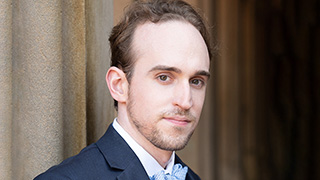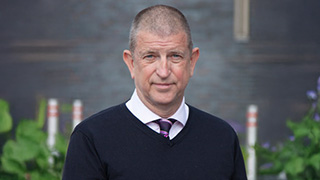Chemistry Professor Gregory Wiedman Receives Patent for Antifungal Peptides
Thursday, August 29, 2024
 Recently, Seton Hall University Professor of Chemistry Gregory Wiedman, Ph.D., head of the 3B Lab received a patent for antimicrobial peptides designed to help fight against Cryptococcus
neoformans, an invasive fungus known to cause illnesses such as fungal meningitis.
Previous work showed that deleting a protein called the “Cdc50 loop region” made it
easier for existing antifungal drugs to attack the fungus. Now that they have found
this vulnerability in fungi, the group is working on creating molecules with antifungal
properties and developing antimicrobial peptides. The group discovered that when their
molecules are combined with different antimicrobial drugs, they have a stronger effect
on fungi. With this understanding, the group has modified their molecules with a special
lipid tail, to attack fungi. Along with literature on their previous studies regarding
antifungal molecules, their patent also discusses the fungi’s inability to attack
red blood cells. This patent was filed in collaboration with Rutgers University Professor
Chaoyang Xue Ph.D. and former Seton Hall chemistry graduate student Robert Tancer,
Ph.D.
Recently, Seton Hall University Professor of Chemistry Gregory Wiedman, Ph.D., head of the 3B Lab received a patent for antimicrobial peptides designed to help fight against Cryptococcus
neoformans, an invasive fungus known to cause illnesses such as fungal meningitis.
Previous work showed that deleting a protein called the “Cdc50 loop region” made it
easier for existing antifungal drugs to attack the fungus. Now that they have found
this vulnerability in fungi, the group is working on creating molecules with antifungal
properties and developing antimicrobial peptides. The group discovered that when their
molecules are combined with different antimicrobial drugs, they have a stronger effect
on fungi. With this understanding, the group has modified their molecules with a special
lipid tail, to attack fungi. Along with literature on their previous studies regarding
antifungal molecules, their patent also discusses the fungi’s inability to attack
red blood cells. This patent was filed in collaboration with Rutgers University Professor
Chaoyang Xue Ph.D. and former Seton Hall chemistry graduate student Robert Tancer,
Ph.D.
One of the main reasons Weidman and his colleagues wanted to pursue this patent is
so they would be able to develop molecules that doctors could use in the clinic. They
have now began conducting customer discovery to see which kind of market would have
interest in their technologies. This customer discovery was part of the National Science Foundation Innovation Corps Program . Looking ahead, the group is looking to conduct preclinical work to eventually begin
working with animals. Currently, they are assessing funding opportunities for their
research as well as finding start-up incubators to help further the development of
their technology.
Seton Hall has a robust Department of Chemistry and Biochemistry with a wide range of faculty researching drug discovery, physical chemistry, organic
chemistry, and other areas. The Department offers both the masters and doctoral degrees.
The Department of Chemistry and Biochemistry is pleased to announce a new accelerated
BS-MS program that allows students to earn both degrees in 5 years. Students interested in STEM
research should contact Associate Dean Mitra Feizabadi, and students interested in STEM graduate programs should contact Associate Dean
Michael Dooney.
Categories: Health and Medicine, Research, Science and Technology






